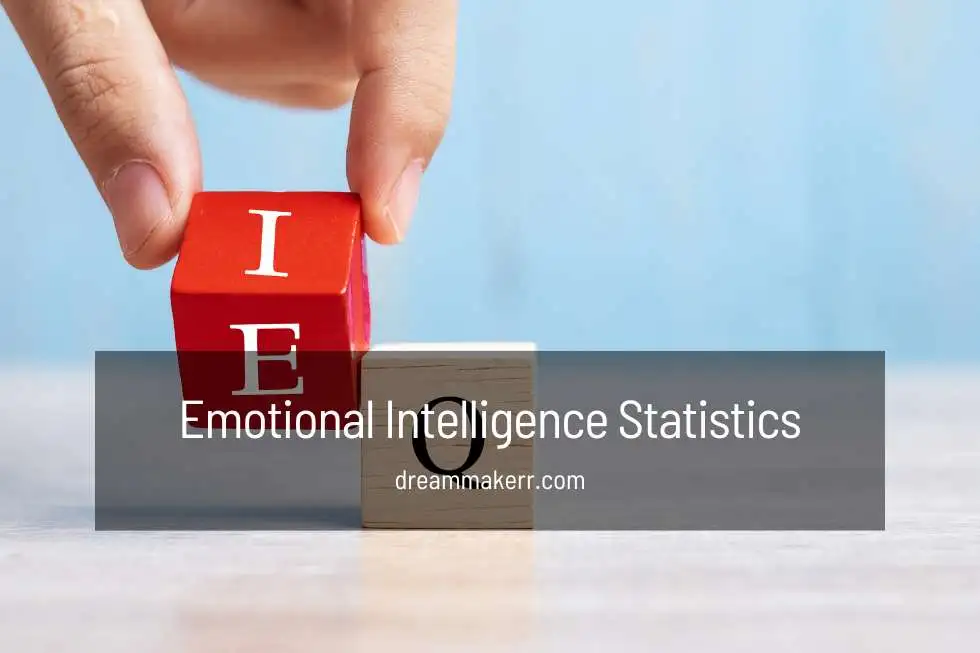On this page

47 Emotional Intelligence Statistics & Facts
Many smart individuals are often linked with having a high IQ.
However, according to emotional intelligence statistics, those who thrive and succeed typically possess more intelligence (EQ) than raw intellectual abilities.
- Individuals with high EQ scores tend to outperform those with IQs in 70% of cases due to their better grasp of emotions and adeptness in managing them.
- As we dive deeper into the realm of intelligence it becomes increasingly evident that it plays a role in achieving success across professions, industries and organizations.
- In the past standardized measures of intelligence like the Intelligence Quotient (IQ) were widely used as predictors of success.
- Interestingly, having an IQ score is no longer considered an indicator of success in today’s world (2024).
While intelligence is undoubtedly important, its significance has been somewhat exaggerated in the workplace.
The truth is that raw intelligence or IQ alone holds value unless accompanied by qualities such as self awareness and emotional intelligence.
Otherwise it merely signals an individual’s proficiency in “performing on tests”.
Key Facts About Emotional Intelligence
- 95% believe they are self-aware, but according to tests, only 15% of individuals are genuinely aware of themselves
- 58% of the variation in job success is attributed to emotional intelligence.
- In the workplace, emotional intelligence is a factor that predicts the success of 90% of high performers
- Most workers have a 99% probability of dealing with at least one person who is not self-aware
- Leaders who have empathy outperform their counterparts by 40%
General Emotional Intelligence Statistics
- The Emotional Intelligence market, valued at $868 million in 2021 is expected to experience a growth rate of 25.2% from 2022, to 2030.
- Emotions play a role in job performance influencing it by 58%. Also, a striking 90% of performing employees exhibit emotional intelligence (EQ).
- The demand for EQ skills is predicted to surge by six times in the 3 -5 years.
- Globally one third (36%) of individuals demonstrate emotional intelligence.
- Team members under leaders report heightened engagement (76%). Enhanced creativity (61%). These individuals exhibit performance, engagement levels and creativity compared to those under empathetic leadership.
- Contrary to belief that Intelligence Quotient (IQ) alone determines success, social and emotional intelligence are revealed as factors accounting for up to 80% of overall success.
- Restaurants overseen by individuals with higher EQ witness an annual profit growth of around 22%.
- Individuals working in Human Resources (HR) boast the EQ score at an impressive level of 76.
- Emotional intelligence plays a role in both professional accomplishments attributing more than half (60%) towards individuals achievements.
- Most individuals believe they possess self awareness. Only a small percentage, 10-15% truly exhibit this trait.
Self-Awareness Emotional Intelligence Statistics
According to Tasha Eurich, an organizational psychologist, many individuals seem to be in denial. Self-awareness is about knowing who you are and how others perceive you. It’s critical for professional success, leadership effectiveness, and job performance.
However, it isn’t as widespread in today’s business environment.
- You don’t have to look to spot a colleague who lacks self awareness. A significant number of workers have bosses, clients and coworkers who are oblivious to their actions.
- Surveys indicate that while many people believe they are self aware only a small percentage truly demonstrate this quality.
- Among the groups in the workplace it is often peers who are seen as the unaware with a majority of employees having at least one clueless colleague.
- It’s almost certain that working Americans will encounter someone lacking self awareness in their lives.
- Effective leadership hinges on self awareness with a percentage of leaders exhibiting this trait. Recognizing how one’s actions impact others and making decisions are aspects of successful leadership.Individuals with levels of self awareness tend to perform in evaluations, secure promotions and assume leadership roles more frequently.
- This skill enables them to navigate dynamics and enhance their overall performance.
- Self aware individuals experience improvements in managing stress and emotions which leads to coping mechanisms and overall well being.
- Those with self awareness skills also tend to have fulfilling personal and professional relationships due to their empathy, communication abilities and conflict resolution skills.
- Teams that are self aware tend to see a 20% increase in productivity as team members have a grasp of their strengths and weaknesses which promotes collaboration and efficiency.
- Self awareness has been shown to lead to a 15% reduction in symptoms of anxiety and depression as it allows individuals to recognize and deal with their needs effectively.
- Students who exhibit self awareness levels typically experience a 12% improvement in performance by setting goals, staying driven and responding positively to feedback.
Emotional Intelligence at School
- Students who engage in programs focused on intelligence (EI) experience a 11% enhancement in their academic performance. These programs assist students in handling their emotions leading to improved concentration and behavior in the classroom.
- Schools that introduce EI training observe a 9% reduction in problems such as aggression, bullying and disciplinary incidents. Emotional intelligence aids students in developing conflict resolution abilities and empathy.
- Participants in EI programs demonstrate a 10% increase in emotional skills encompassing teamwork, communication and building relationships. These skills play a role in creating a school atmosphere.Both teachers and students benefit from schools that incorporate EI initiatives with an enhancement in well being.
- 80% of teachers and students report reduced stress levels and increased satisfaction contributing to a supportive learning environment.
- Studies conducted over time suggest that individuals with intelligence are more likely to achieve success in their careers and lead fulfilling personal lives. They are prone to health, reduced levels of anxiety and depression as well, as stable relationships.
Emotional Intelligence at Work
- People with higher emotional intelligence (EQ) scores earn an average of over $29,000 more annually compared to those with lower EQ. Having emotional intelligence is associated with career advancement and increased productivity. It’s not surprising that individuals with EQ tend to have higher incomes than those with lower EQ levels. However there’s no need to worry much because as you grow older your emotional intelligence tends to improve and you can work on enhancing it over time.
- For every point increase in your EQ score you can expect $1,300 in your earnings. While IQ scores may reflect a person’s job related skills and abilities, having a high EQ score seems to be a predictor of success. Nevertheless improving your intelligence also comes with benefits.
- A recent survey revealed that 75% of Fortune 500 companies provide training programs focused on intelligence. These performing companies in the United States owe part of their success to prioritizing intelligence training for their employees. Recognizing the value of training they incorporate it into their employee development initiatives.
- In determining who will succeed in their fields, intelligence (EQ) proves to be four times more impactful than IQ.
- The importance of understanding and handling emotions effectively has been found to play a role in achieving success in one’s endeavors as indicated by a comprehensive 40 year study involving UC Berkeley PhD graduates. Emotional intelligence (EQ) has been shown to hold significance than intelligence (IQ) with EQ being four times more influential in determining an individual’s accomplishments within their respective fields. Skills such as listening, stress management and empathy have been identified as components that can contribute to one’s success. Even individuals with abilities can benefit from possessing a higher EQ level.
- In the realm of software development those with top tier EQ scores within the 10% bracket are capable of developing applications at a pace three times faster than their counterparts with lower EQ levels. This underscores the impact of intelligence on productivity in professions where its relevance may not be immediately apparent. It is evident that anyone stands to gain from cultivating a sense of intelligence or engaging in training programs aimed at enhancing this skill set.
- Studies have revealed that leaders who exhibit empathy outperform their counterparts by a significant margin of 40%. Empathy has been identified as a critical trait essential for leadership by DDI, a global leadership development organization. Research indicates that managers and leaders who demonstrate empathy are perceived to excel in their roles fostering performance among both themselves and their subordinates.
- Leaders who communicate with empathy create an environment where team members feel valued and supported leading to performances driven by feelings of care and empowerment, within the team.
How Does Emotional Intelligence Affect Companies?
It would be wise for businesses to invest in emotional intelligence training for their workers to improve EQ scores, given the direct link between job success and emotional intelligence.
- Improving employee performance involves not enhancing their skills and knowledge but also taking into account their intelligence.
- Emotional intelligence has a 58% influence on job performance.
- Restaurants overseen by high EQ individuals with higher levels of awareness see a 22% increase in profits annually.
- According to recent research, over 90% of top-performing employees have high emotional intelligence.
- However, the top 20% of the high-EQ employees made up only 20% of the company’s low performers.
- With this knowledge in hand, it’s easy to see that emotional intelligence significantly influences commercial success. The key elements affecting production are emotional self-awareness, happiness, social responsibility, reality testing, and interpersonal relationships — all of which are components of emotional intelligence.
- Workers with managers with high EQ levels are nearly four times less likely to leave their jobs than those with low EQ managers.
- Employees who feel trusted enough to express their concerns in a business setting, whether work-related or not, are more likely to do so. They’re also more inclined to speak up because they believe they have been heard, raising employee engagement and lowering turnover rates.
- Emotional intelligence could be evaluated when employers seek persons who have leadership potential or are in line for a raise or promotion. Even if you don’t have a high EQ score, you may still be an effective employee if you’re not being recognized for it.
How Much Do Companies Value Emotional Intelligence?
Problem-solving, stress management, communication, and adaptability are all examples of soft skills. These qualities are more difficult to instill in someone than how to use Excel. It generally takes a lot of training to teach somebody better soft skills, but the result is well worth it.
- When recruiting for talent, 72 % of hiring managers place a higher premium on emotional intelligence than intellect. Companies understand that although having someone with strong hard skills is beneficial, an individual with high emotional intelligence will be more profitable in the long run.
- According to hiring managers, employees with EQ are more likely to solve the conflict, sympathize with coworkers, and remain calm under pressure.
- 59% of employers will not hire a candidate with a high IQ but poor EQ.
- High-IQ people might have the necessary talents to be productive workers in the workplace, but those with low EQ may be a pain to deal with. That is why employers are unwilling to compromise. Even if a person has a high IQ, they will not be hired if they have a bad EQ.
- According to one survey, high EQ employees are preferred over high IQ individuals for a promotion 75% of the time.
- High emotional intelligence leaders are more likely to be productive and successful. They typically lead by example and give a great deal of consideration before making business decisions. They also listen as much as they talk, which is an excellent attribute in those who hold a leadership position.
- 30% of HR managers believe that employers put insufficient emphasis on emotional intelligence throughout the application procedure.
- Emotional intelligence isn’t nearly as emphasized as it should be, but it is critical to success. However, emotional intelligence isn’t nearly enough highlighted as it should be. Companies are now taking appropriate action to implement this change because of the growing awareness of the benefits of employing emotionally intelligent people or training workers to enhance their emotional intelligence.
- HR managers are finding it more challenging to teach soft skills than technical abilities, according to 40% of respondents.
In Conclusion
The world is constantly changing. The same goes for the workplace.
Successful business leaders understand that achieving success is not a stroke of luck or a simple formula. It requires thought out plans and effective strategies.As a business leader you can utilize marketing data and tactics to enhance employee productivity and leadership skills.
Starting from the hiring process emotional intelligence plays a role. It’s essential to have team members who share values and beliefs. Working with individuals who don’t turn every day into a nightmare is also important.
For employees being relatable, self driven, focused on goals.
Having emotional regulation are key qualities.
By honing your intelligence through practice and potential expertise in EQ you can become someone who uplifts others and manages both challenging times effectively.By fostering intelligence among both employees and employers many instances of harassment and inefficiency can be minimized.
Emotional intelligence is vital for creating a caring work environment because ultimately we are all human beings, with emotions woven into our identities.
FAQs
What percentage of success does emotional intelligence account for?
TalentSmart suggests that emotional intelligence plays a role in success accounting for 58% of a person’s career achievements. Additionally individuals with intelligence earn an average of $29,000 more annually compared to those with lower emotional intelligence levels. For each point scored on an intelligence assessment one can expect a yearly increase of $1,300, in earnings.
What is the typical EQ score?
According to emotional intelligence statistics, the typical EQ score ranges from 90 to 100 with an optimal score set at 160. People with a higher EQ tend to understand and empathize with others effectively. If your EQ rating is low, you can enhance your intelligence by developing skills to manage and regulate challenging emotions.
Is emotional intelligence on the decline?
Recent findings, from the Journal of Personality suggest that over the years there has been a decline in three key aspects of emotional intelligence. A comprehensive review of 70 research papers involving 17,000 individuals revealed decreases in well being, self control and emotionality. The study indicates that increased technology usage is associated with reduced levels of self control and overall happiness.
Statistics for this article were gathered from the following sources:

Petri Maatta is a mindset coach and neuroscience-focused author with 15 years of experience in personal transformation and success psychology. After seven years of business failures, he discovered the power of manifestation through a Fortune 500 mentor. Now, he shares neuroscience-backed strategies through DreamMaker membership, helping others transform their businesses and lives on their own terms.
Read My Story here.
Share This Story, Choose Your Platform!
You want to manifest a new car, but you’re wondering: Does this really work? Here’s
Many smart individuals are often linked with having a high IQ. However, according to emotional
According to online dating statistics over 90% of people believe in love at first sight,



